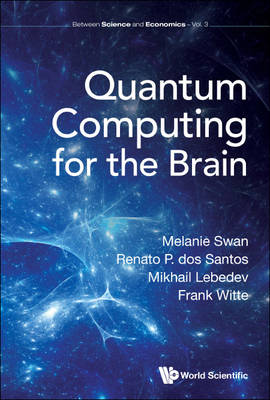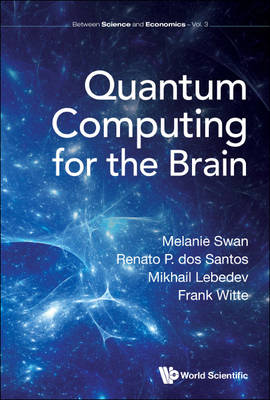
- Afhalen na 1 uur in een winkel met voorraad
- Gratis thuislevering in België vanaf € 30
- Ruim aanbod met 7 miljoen producten
- Afhalen na 1 uur in een winkel met voorraad
- Gratis thuislevering in België vanaf € 30
- Ruim aanbod met 7 miljoen producten
Zoeken
€ 225,95
+ 451 punten
Omschrijving
Quantum Computing for the Brain argues that the brain is the killer application for quantum computing. No other system is as complex, as multidimensional in time and space, as dynamic, as less well-understood, as of peak interest, and as in need of three-dimensional modeling as it functions in real-life, as the brain.Quantum computing has emerged as a platform suited to contemporary data processing needs, surpassing classical computing and supercomputing. This book shows how quantum computing's increased capacity to model classical data with quantum states and the ability to run more complex permutations of problems can be employed in neuroscience applications such as neural signaling and synaptic integration. State-of-the-art methods are discussed such as quantum machine learning, tensor networks, Born machines, quantum kernel learning, wavelet transforms, Rydberg atom arrays, ion traps, boson sampling, graph-theoretic models, quantum optical machine learning, neuromorphic architectures, spiking neural networks, quantum teleportation, and quantum walks.Quantum Computing for the Brain is a comprehensive one-stop resource for an improved understanding of the converging research frontiers of foundational physics, information theory, and neuroscience in the context of quantum computing.
Specificaties
Betrokkenen
- Auteur(s):
- Uitgeverij:
Inhoud
- Aantal bladzijden:
- 552
- Taal:
- Engels
- Reeks:
- Reeksnummer:
- nr. 4
Eigenschappen
- Productcode (EAN):
- 9781800610613
- Verschijningsdatum:
- 22/06/2022
- Uitvoering:
- Hardcover
- Formaat:
- Genaaid
- Afmetingen:
- 152 mm x 229 mm
- Gewicht:
- 902 g

Alleen bij Standaard Boekhandel
+ 451 punten op je klantenkaart van Standaard Boekhandel
Beoordelingen
We publiceren alleen reviews die voldoen aan de voorwaarden voor reviews. Bekijk onze voorwaarden voor reviews.











